MVP 2017: Sizing up the finalists
Let the debates begin. Major League Baseball wraps up its awards week with the most contentious — and prestigious — of all its honors. The 2017 MVP will be decided, and there’s no easy choice in either league this year.
Let’s start in the American League, where at least it’s a two-man race. José Altuve and Aaron Judge will go head-to-head — or head to shoulder — in what could be a tight race. José Ramírez is the third finalist, and that’s where he’ll likely finish in the voting. That takes nothing away from him. He was exceptional, but many consider this a fight between Altuve and Judge.
Over in the National League, it’s even more difficult. Each of the three finalists have a legitimate shot at the award. Paul Goldschmidt, Giancarlo Stanton and Joey Votto all bring different things to the table too. Stanton brings immense power, Votto has great plate discipline and Goldschmidt has the best all-around game (and he plays on a winning team … which matters to some voters).
MLB Network will reveal the winners in a special at 6 p.m. ET on Thursday. You can check in with The Stew for coverage when the news is official. Until then, we’ll do our best to break down all six contenders for the awards, complete with our picks for the award at the bottom of the post.
One thing to keep in mind, all of these awards are voted on prior to the start of the postseason. The voters turned in their ballots before the first wild-card game. Altuve doesn’t get extra credit because he won the World Series.
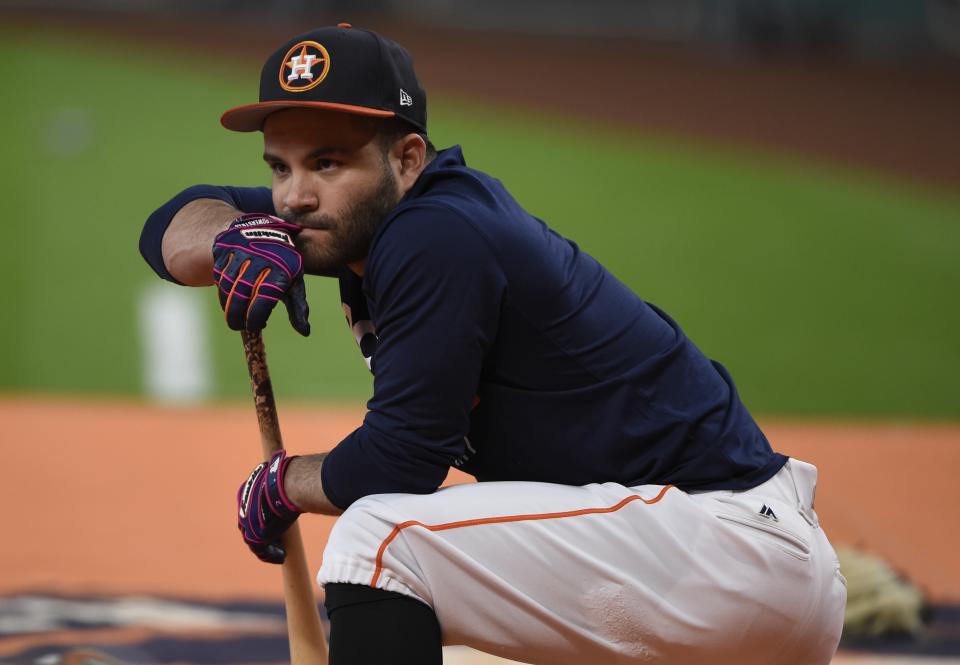
AMERICAN LEAGUE
José Altuve — 2B, Houston Astros
In brief: It’s weird to think José Altuve can really get better, but that’s precisely what he did in 2017. His .348/.410/.547 slash line established a new career-high for Altuve in average, on-base percentage and slugging. His 24 home runs tied a career-high, and he swiped 32 bases. He played 153 games on one of the best teams in the majors.
Key stats: Altuve’s whole Baseball Reference page sticks out here, but the major focus of the MVP award will hinge on strikeouts. Altuve’s 12.7 percent strikeout rate ranked as the seventh lowest among qualified hitters in the AL. Making contact allows Altuve to hit for such a high average. That’s where a lot of his value came from early in his career. Improving his patience and hitting for power has turned him into a perennial MVP candidate, but he’s always been a strong contact hitter.
Case for: Altuve’s case is mostly built on an exceptional batting average and a lack of strikeouts. Those are the two areas where he holds a big advantage over Aaron Judge. He’s also a better baserunner. That’s born out in the metrics and with his solid 32-6 stolen base to caught stealing rate. He’s one of the best all-around players in the game.
Case against: Altuve is fantastic, but Judge may have been better. Sure, hitting for average is fun, but Judge reached base more often and cranked 52 home runs. 52! Oh, and Judge hit .284, so it’s not like he’s a slouch there either. They are incredibly different hitters, but both approaches work. Judge’s lead in home runs could be the difference.
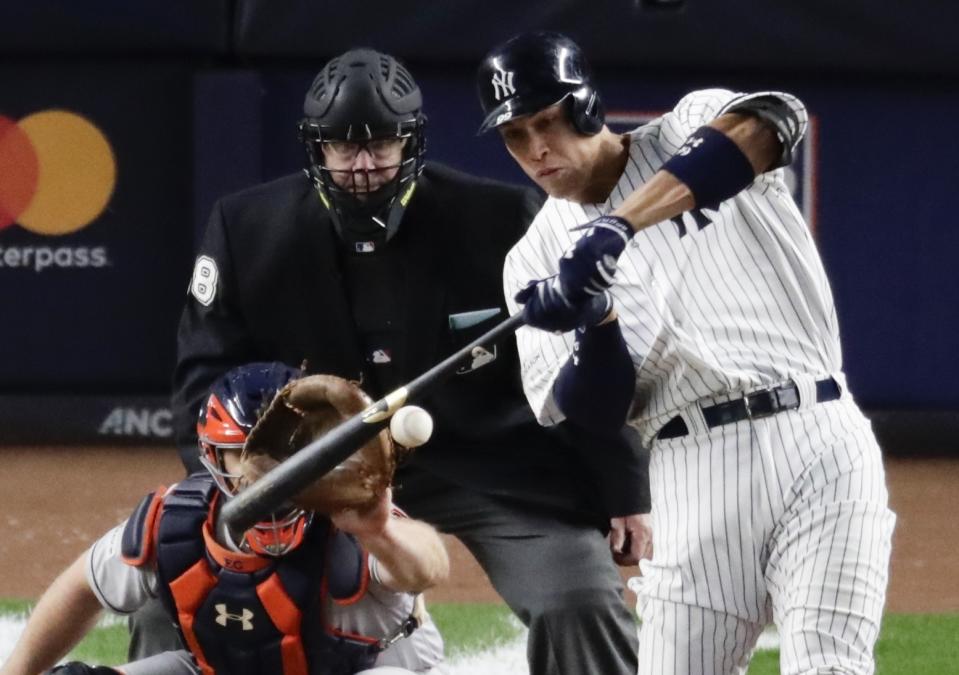
Aaron Judge — OF, New York Yankees
In brief: What a hell of a way to introduce yourself to the majors. Aaron Judge exploded onto the scene with one of the best rookie seasons ever. His 8.2 fWAR ranked tied for fourth all-time, ahead of Fred Lynn and Albert Pujols. Maybe that’s not surprising. Judge did hit .284/.422/.627, with 52 home runs. For much of the year, he was the biggest story in baseball. This shouldn’t count toward the ballot, but he put on an absolute show in the Home Run Derby. No matter what happens, this was an unbelievable start to his career.
Key stats: Everything related to Judge’s power. His 52 home runs led the AL, and was good for second in baseball. His .627 slugging percentage ranked fourth overall. He also excelled in patience, as his 18.7 percent walk rate was good for second, behind only Joey Votto. His .422 on-base percentage was good for third in baseball.
Case for: Judge led Altuve in on-base percentage, slugging percentage, home runs and fWAR. If you’re a traditionalist, he also led in runs and RBI. And keep in mind both guys hit in the No. 3 hole, so it’s not like Altuve missed out on RBI chances because he hit leadoff. There’s a very strong case that Judge was the best player in baseball during his rookie season. Altuve is more established, but Judge might have been better.
Case against: It’s batting average and strikeouts. Altuve led average by a sizable margin, though Judge did hit .284. This is likely to come down to whiffs, though. Altuve is one of the best in baseball at making contact. Judge is the polar opposite. His 30.7 percent strikeout rate was fourth highest in baseball. If you hate strikeouts, and love batting average, Altuve is your guy.
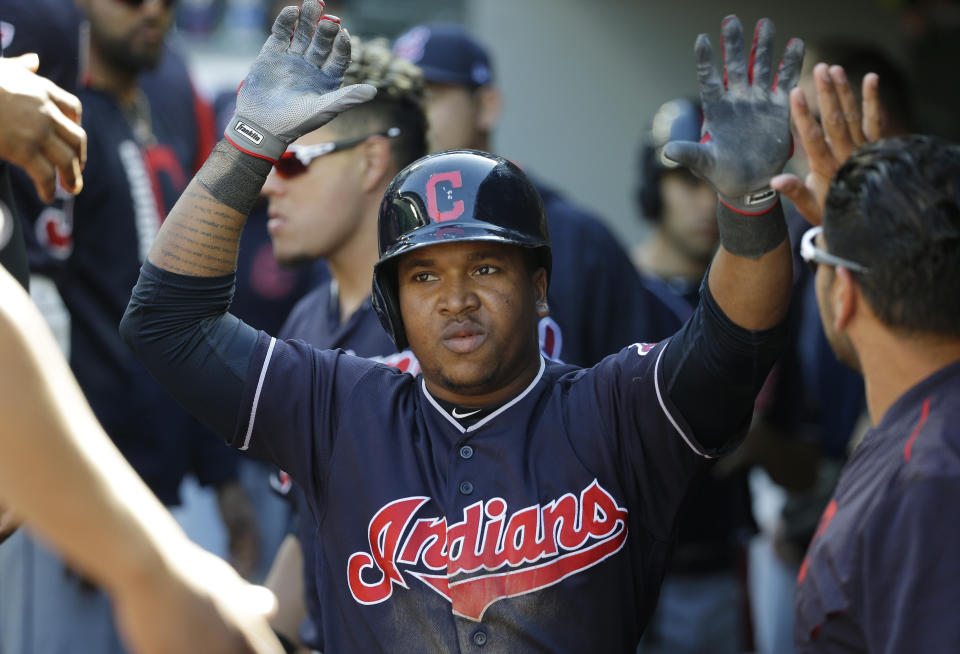
José Ramírez — 3B, Cleveland Indians
In brief: José Ramírez proved his 2016 was no fluke. Instead, he somehow built on a tremendous breakout by increasing nearly all his numbers. His .318/.374/.583 slash line represented a new career high in all three categories. He also smashed a career-high 29 home runs. He also played two positions — third base and second base — for Cleveland, and was above average at both spots.
Key stats: Compared to Judge and Altuve, Ramírez’s stats aren’t going to really stand out. The one area where he might have them beat is defense, which is tough to fully quantify. The metrics liked Ramírez this year, but those can be spotty and unreliable. Still, Altuve and Judge are considered average if not above average at their positions. Ramírez is considered above average and can play multiple spots well. Versatility matters.
Case for: There’s not one. Ramírez has become a great player. He might be the most fun player to watch in baseball, and hey, that’s gotta be worth something. His defense and versatility gives him something neither Judge or Altuve have, but both of them have better offensive numbers. Based on both his 2016 and 2017, Ramirez might have established himself as a perennial MVP contender, and that’s an unbelievable accomplishment for a player who never ranked on Baseball America’s top-100 prospect list.
Case against: Judge and Altuve were just better. Altuve holds an edge in average and on-base percentage. Judge blows both out of the water in slugging and home runs. Let’s not take anything away from Ramírez. He’s great, and we love watching him. But he was the third best player in the AL this year.
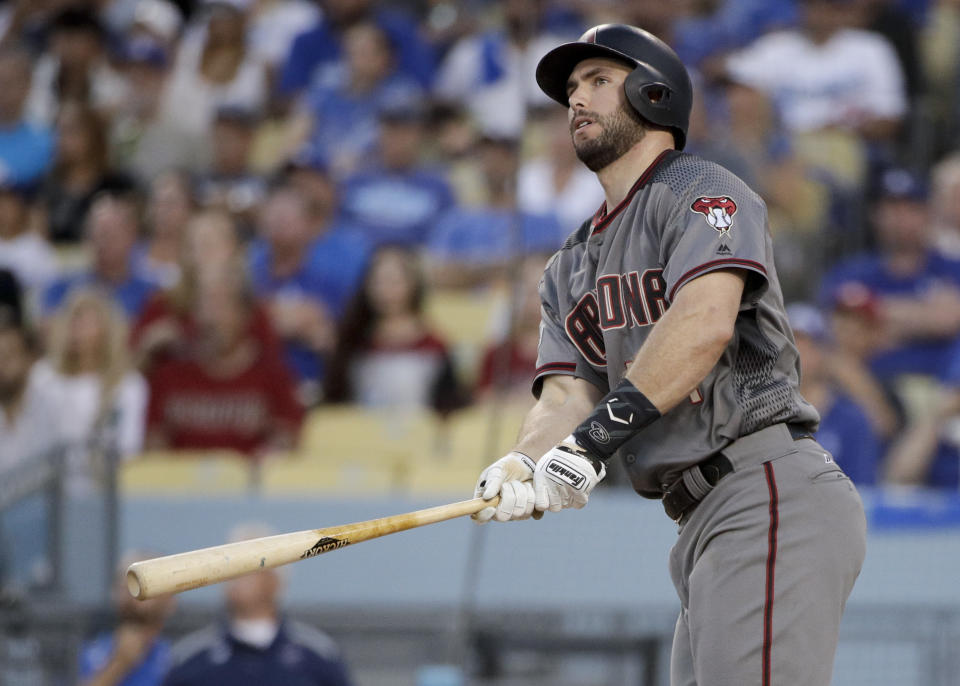
NATIONAL LEAGUE
Paul Goldschmidt — 1B, Arizona Diamondbacks
In brief: It was another typical Paul Goldschmidt season. He hit .297/.404/.563, with 36 home runs, in 155 games. By fWAR, it was only his third-best season, but that just speaks to how great and consistent he’s been over his career. A “typical Paul Goldschmidt season” shouldn’t be viewed as a negative. It means he once again was good enough to contend for the MVP award.
Key stats: Goldschmidt is going up against two players with some pretty extreme offensive performances, so he’s more of the all-around dude. All his stats are impressive, though none are otherworldly. The one area he separates himself is speed, where he stole 18 bases and is considered a strong base-runner. It’s weird to praise a first baseman for his speed, but Goldschmidt breaks the mold there.
Case for: Goldschmidt feels more like the traditional choice for MVP. All of his stats are great. What he lacks in offense compared to the other finalists, he makes up for with base-running and defense. Nothing major sticks out, but everything is above average. But the main reason Goldschmidt may take home the award is that he plays on a winning team. The voters have valued that in the past, so that may be enough to sway them his way even though the stats aren’t over-the-top impressive.
Case against: Stanton his 59 home runs. Votto matched Goldschmidt in home runs, and topped him in average, on-base percentage, slugging percentage, walk rate and had a better strikeout rate. You can’t make a strong case for Goldschmidt based on stats. Not against these two.
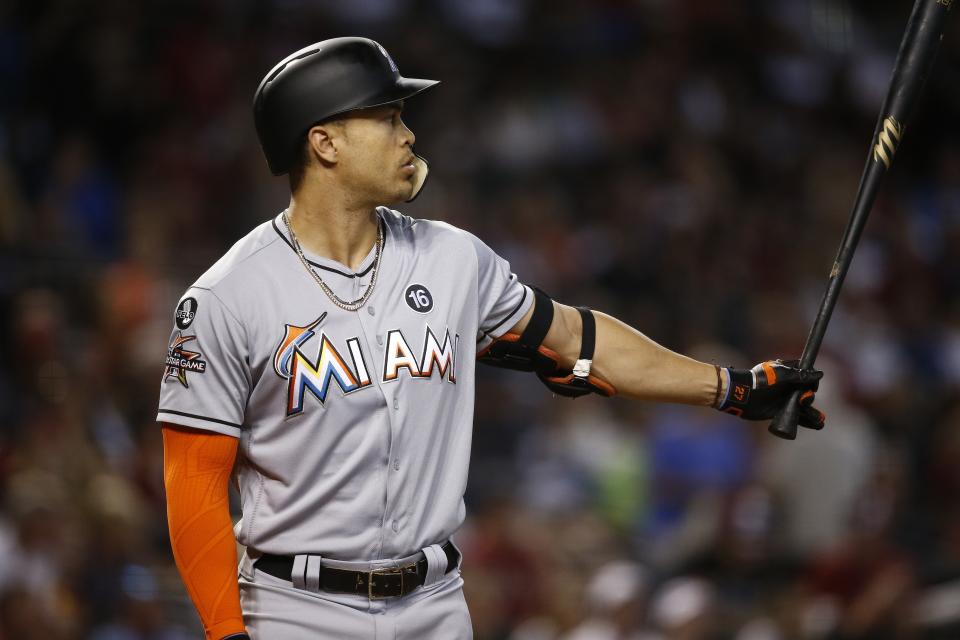
Giancarlo Stanton — OF, Miami Marlins
In brief: We got to finally see Giancarlo Stanton healthy for an entire season, and it was glorious. He crushed an absurd 59 home runs, and went on a run in August that rivaled 2001 Barry Bonds. Opposing pitchers — and a few baseballs — haven’t recovered yet.
Key stats: All the power numbers. His 59 home runs led baseball. As did his .631 slugging percentage. Not surprisingly, he also led the league in RBIs. Let’s face it, that’s going to happen when you hit close to 60 home runs. His 12.3 percent walk rate was among the top-25 hitters in baseball. And while his strikeouts were still an issue, he cut six percent off 2016’s rate, helping him hit above .280 for the first time since 2014.
Case for: Dingers! Stanton’s lofty home run total is the only thing that stands out when compared to Goldschmidt and Votto. And we shouldn’t simply write that off. It’s a substantial lead. He belted 13 more homers than those two. He was the first player since Bonds and Sammy Sosa topped it in 2001. For about a month, it seemed like every ball he hit left the park. He also had a slight lead over the other finalists with a 6.9 fWAR.
Case against: When you start to look at the rest of his numbers, his candidacy falls apart. Goldschmidt had a slightly better average and a decent lead in on-base percentage. Votto was even more dominant in both categories. Goldschmidt and Votto even walked more, and Stanton struck out the most of the trio. He also didn’t hit 60. That’s an unfair argument, but some people value round numbers and seeing Stanton get there may have helped his candidacy. Oh, and his team was bad. People care about that too.
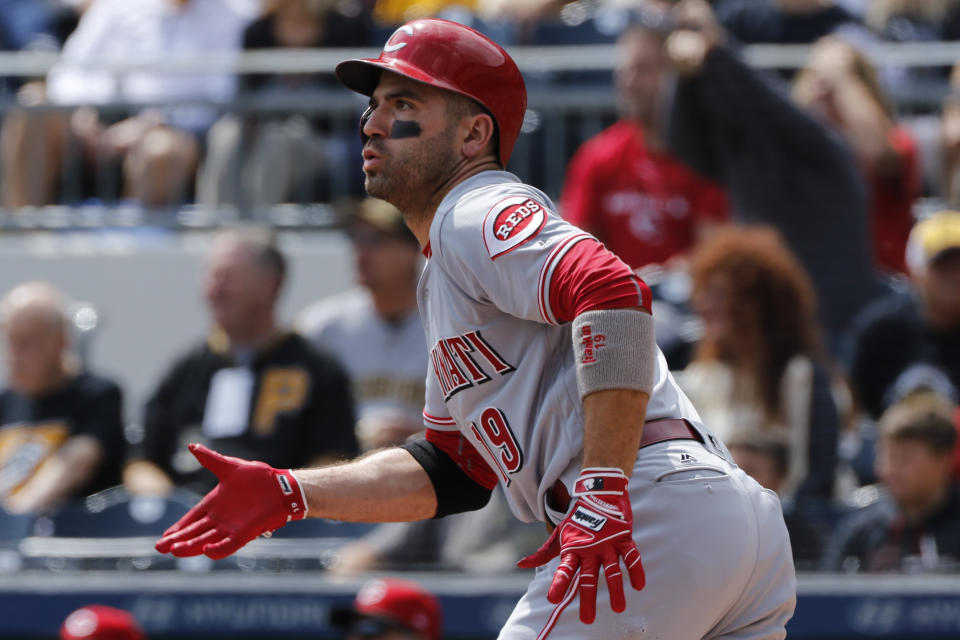
Joey Votto — 1B, Cincinnati Reds
In brief: To say Votto had a typical year is both fair and unfair. His .320/.454/.578 slash line was eerily similar to what he put up in 2016. But Votto added slightly more pop, and somehow showed an even better walk rate. But, perhaps most impressively, he just stopped striking out.
Key stats: Votto finished sixth in average, first in on-base percentage and ninth in slugging percentage. His 19 percent walk rate was tops in the majors. His 11.7 strikeout rate was ninth-best in the majors. During his MVP year in 2010, Votto’s 19.3 strikeout rate tied for 30th worst in baseball. He struck out less than Jose Altuve in 2017. Joey Votto!
Case for: Votto posted the best batting average and on-base percentage of the three candidates, and it wasn’t really close. His 36 home runs matched Goldschmidt. His 6.6 fWAR was close enough to Stanton’s to make it debatable, and a full win higher than Goldschmidt’s. Getting on base is arguably the most valuable skill in baseball. Votto got on more than anyone. But his value wasn’t just due to leading the league in walks, his 168 OPS+ also led the NL.
Case against: His team didn’t win. If you compare Votto and Goldschmidt’s numbers, Votto easily comes out ahead, but his team didn’t make the playoffs. Goldy’s did, and that matters to some voters. Stanton’s immense power also speaks loudly. He falls short everywhere else, but challenging 60 homers — and doing so in a manner people find “legitimate” — could prove to be too much for either guy to overcome.
OUR PICKS
Chris Cwik
AL: Aaron Judge — Strikeouts be damned. Judge had a better on-base percentage and hit twice as many home runs as Altuve. It’s close, but I give Judge the slight edge.
NL: Joey Votto —The dude holds a .050 lead in on-base percentage over Goldschmidt. He hit for the best average of the trio and was no slouch with power. He also stopped striking out. He’s somehow under-appreciated.
Mike Oz
AL: Jose Altuve — While Judge was great, he slumped for a while. Altuve was consistently great all year long.
NL: Giancarlo Stanton — Fifty-nine homers and 132 RBIs are too hard to deny, even if his team didn’t make the playoffs like Goldschmidt’s and he couldn’t match Votto’s great on-base numbers.
Liz Roscher
AL: Jose Altuve — Altuve has sustained a frankly insane level of play for several years now. It’s always tough to choose between him and Mike Trout, but with Trout missing out on the final three, it’s Altuve all the way.
NL: Joey Votto — He might be more machine than man at this point. How has he been so good for so long? How does he keep getting better? Like the man himself, it’s a mystery.
Mark Townsend
AL: Jose Altuve — This isn’t just about Altuve’s performance in 2017, which was incredible. It’s about his consistent brilliance over several seasons.
NL: Joey Votto — If Votto played for a contender, I don’t think there would be a debate. I love Stanton and Goldschmidt, but Votto’s production was ridiculous.
More MLB coverage from Yahoo Sports:
– – – – – – –
Chris Cwik is a writer for Big League Stew on Yahoo Sports. Have a tip? Email him at christophercwik@yahoo.com or follow him on Twitter! Follow @Chris_Cwik


